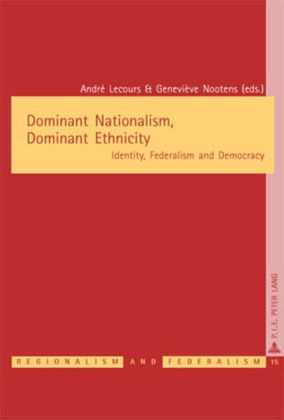
Dominant Nationalism, Dominant Ethnicity
Identity, Federalism and Democracy
Herausgegeben: Lecours, André; Nootens, Geneviève
Versandkostenfrei!
Versandfertig in 6-10 Tagen
64,80 €
inkl. MwSt.

PAYBACK Punkte
0 °P sammeln!
Although nationalism and ethnicity have long been associated with minority populations, an emerging literature looks at how the state and/or a majority group interact with minorities, and how, behind the expression of the nation promoted by the state, there is often an ethnic core. This book contributes to this emerging literature on dominant nationalism and dominant ethnicity by presenting multidisciplinary contributions that center on how states deploy their own nationalism, and how the state's nation-building and nation-consolidating processes are very often spearheaded by a specific ethnoc...
Although nationalism and ethnicity have long been associated with minority populations, an emerging literature looks at how the state and/or a majority group interact with minorities, and how, behind the expression of the nation promoted by the state, there is often an ethnic core. This book contributes to this emerging literature on dominant nationalism and dominant ethnicity by presenting multidisciplinary contributions that center on how states deploy their own nationalism, and how the state's nation-building and nation-consolidating processes are very often spearheaded by a specific ethnocultural group. It focuses on the interrelated issues of identity, federalism and democracy. Dominant nationalism and ethnicity involve the projection, the promotion, and sometimes the imposition by the state and/or a dominant group of an identity, which can be challenged, negotiated and/or resisted by minority groups. This brings questions for democratic practices, since it raises the issue of self-rule.
Since dominant nationalism and ethnicity are shaped by ideas and institutions relating to the territorial division of power, federalism is crucial for understanding these phenomena. The book is amongst the first to look at dominant nationalism and ethnicity from historical, theoretical, empirical and normative perspectives.
Since dominant nationalism and ethnicity are shaped by ideas and institutions relating to the territorial division of power, federalism is crucial for understanding these phenomena. The book is amongst the first to look at dominant nationalism and ethnicity from historical, theoretical, empirical and normative perspectives.












